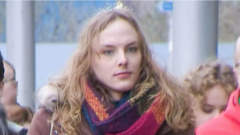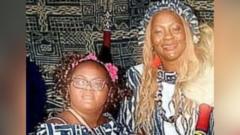How Will AI Models Shape Beauty Standards in Vogue?

AI in Fashion: The Controversy of Artificial Models
This past week, a wave of outrage surged through social media when it was revealed that an AI-generated model graced the pages of Vogue. This advertisement, showcasing Guess's latest collection, features a woman—complete with perfect blonde curls, a sun-kissed glow, and a slim physique—engaging in everyday activities like sipping coffee. However, a closer inspection unveils a crucial detail: the model was created by Seraphinne Vallora, an AI marketing company that has made its mark by generating images without human models. This development raises significant questions about the future of fashion, beauty standards, and the very essence of art itself.
In a time when the lines between technology and creativity are blurring, the ethical implications of using AI in creative fields are coming into sharp focus. The AI-generated model, which Vogue seemingly approved for advertising, has ignited a fierce debate about authenticity and the role of artificial intelligence in an industry built on human emotion and artistry.
The Rise of AI in Advertising
Seraphinne Vallora claims to be revolutionizing marketing images by tapping into AI's potential. Their mission is to provide businesses with a ‘cost-effective’ and ‘effortless’ means to create captivating visuals. The company argues that AI can capture a brand’s vision without the logistical challenges of hiring models or conducting photo shoots. However, this raises critical concerns about the implications for real human models and the authenticity of the images produced.
What Does This Mean for Beauty Standards?
The introduction of AI models into fashion advertising prompts a pressing question: what will happen to beauty standards? Leanne Maskell, a former model and author of The Reality Manifesto, believes that AI models are simply an extension of the unrealistic beauty ideals already perpetuated in the industry. According to her, AI-generated images may be cheaper, but they still propagate unattainable standards that can negatively impact individuals' self-esteem and body image.
The Illusion of Perfection
Leanne’s insights reveal a crucial truth: the fashion industry has long relied on techniques like professional makeup, lighting, and Photoshop to create illusions of perfection. AI models, she argues, merely amplify these unrealistic standards by presenting individuals who don’t even exist in reality. This trend, if left unchecked, could further distort perceptions of beauty, leading to damaging effects on self-worth for both models and the general public.
The Ethical Dilemmas of AI in Fashion
Dr. Helena Lewis-Smith, a health psychology researcher, emphasizes that the ethics surrounding image alteration have always been murky. For decades, advertising has utilized airbrushing and digital manipulation, creating an environment where the idealized versions of beauty are not only expected but also normalized. Helena points out that AI-generated images could exacerbate this problem, introducing a new level of unattainability that may cause further harm to individuals’ body images.
The Cultural Impact of AI on Art and Fashion
As AI takes a more prominent role in creative industries, it raises questions about the future of artistry and culture. Many critics argue that art is fundamentally a human endeavor, rooted in emotion, experience, and creativity—qualities that AI cannot replicate. The use of AI in fashion might strip away the nuance of artistic expression, reducing complex human experiences to mere algorithms and data.
AI and the Future of Modeling
With the ongoing integration of AI into the modeling sphere, there is a growing concern among professionals about job security. Models like Leanne fear that the rise of AI could lead to a diminishing demand for human models, as brands opt for cost-effective AI solutions. This shift could not only threaten the livelihood of many in the industry but also contribute to a culture of comparison, where individuals feel pressured to conform to an ideal that is increasingly unattainable.
Fostering Media Literacy and Resilience
Despite the challenges posed by AI in fashion, there is hope that society can push back against these trends. Dr. Helena advocates for incorporating media literacy into education, empowering individuals to critically assess the images they encounter. By understanding the role of AI and the manipulation of images, people may cultivate resilience against unrealistic standards and prioritize their unique qualities over unattainable ideals.
Calls for Change in the Fashion Industry
As discussions around AI in fashion continue, it is essential to consider the broader implications for culture and creativity. The incorporation of AI into the industry could serve as a catalyst for change, prompting vital conversations about representation, diversity, and the definition of beauty. Advocates argue that it’s time for the fashion world to reevaluate what is considered ‘ideal’ and to embrace a more inclusive approach that celebrates individuality rather than conformity.
Frequently Asked Questions
What are the ethical concerns surrounding AI in fashion?
The primary ethical concerns include the potential for AI to perpetuate unrealistic beauty standards, the impact on human models' job security, and the authenticity of artistic expression. Many argue that AI-generated images lack the emotional depth and creativity that human art embodies.
How could AI affect beauty standards?
AI has the potential to create and perpetuate unattainable beauty standards by presenting idealized images that do not reflect reality. This can lead to negative self-image and body dissatisfaction among consumers who compare themselves to these images.
Can society combat the influence of AI in the beauty industry?
Yes, society can combat the influence of AI by promoting media literacy, encouraging critical thinking about images, and advocating for diversity and representation in fashion. Educating individuals about the manipulation of images can empower them to resist unrealistic ideals.
What steps can the fashion industry take to address these concerns?
The fashion industry can address these concerns by prioritizing transparency in advertising, embracing diversity in body types and appearances, and fostering open discussions about beauty standards. Additionally, incorporating more ethical practices regarding model representation and image manipulation can contribute to a healthier industry.
The rise of AI in fashion is a double-edged sword, presenting both opportunities and challenges. While technology can streamline processes and create visually stunning images, it also risks undermining the essence of creativity and individuality. As we navigate this new landscape, it’s crucial to ask ourselves: how do we want our culture and standards of beauty to evolve in the age of artificial intelligence? #AIFashion #BeautyStandards #CreativeIntegrity
```Published: 2025-07-25 15:27:16 | Category: Beauty



